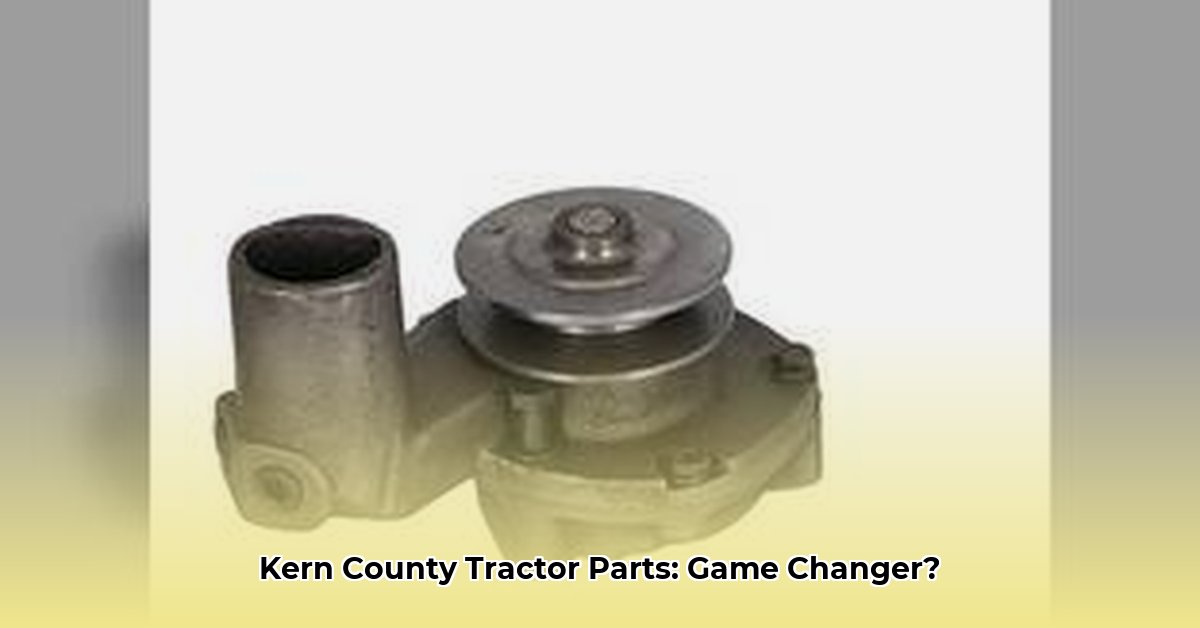
Parts ASAP's Acquisition Spree: Reshaping the Kern County Agricultural Landscape
The agricultural sector in Kern County is undergoing a significant transformation, largely driven by Parts ASAP's aggressive acquisition strategy. This company's rapid expansion, fueled by substantial investment, is consolidating numerous smaller tractor parts suppliers across North America, significantly impacting local farmers and the broader agricultural supply chain. This consolidation presents both opportunities and challenges, requiring careful consideration of its long-term implications. For a broader selection of parts, check out this free parts catalog.
A Giant's Growth: Parts ASAP's Consolidation Strategy
Parts ASAP's business model centers on acquiring smaller, independent tractor parts suppliers. This strategy aims to achieve economies of scale, leading to potentially lower prices and a wider selection of parts for farmers. However, this rapid expansion raises concerns about the potential loss of personalized service and the consistency of service levels across diverse acquired brands. The integration of these disparate operations presents a significant challenge for Parts ASAP's management.
Impacts on Kern County Farmers: Benefits and Drawbacks
The consolidation offers potential benefits to Kern County farmers. Increased access to a wider range of parts through a larger network of distribution centers could reduce downtime and improve operational efficiency. Bulk purchasing power might translate to lower prices for farmers, improving their profitability. However, the potential drawbacks are equally significant. The loss of personalized service from smaller, local suppliers could negatively impact customer relationships. Inconsistencies in service quality and delivery speeds across the newly integrated network are possible risks. The successful integration of acquired businesses depends critically on Parts ASAP's ability to maintain and potentially improve efficiency through technology.
The Voice of the Farmer: Uncertainties and Concerns
While the prospect of wider selection and potentially reduced costs is appealing, farmers in Kern County express concern about the potential loss of personalized service and the reliability of a large-scale operation. Maintaining consistent service quality and timely delivery across a geographically dispersed network is a significant challenge. The concerns centre around the potential for impersonal interactions and longer wait times for parts, disrupting the efficient operation of farms. The long-term impact of these changes remains to be seen. Further research and feedback from farmers are crucial for a complete understanding of this transformation's effects.
Long-Term Implications: Competition, Sustainability, and Innovation
The long-term impact of Parts ASAP's consolidation will depend on several factors. The competitive landscape will likely shift, forcing smaller independent businesses to adapt or potentially exit the market. Parts ASAP's success hinges on its ability to efficiently integrate its acquisitions, improve its logistics network (including technology implementation), and ensure a consistently high level of service. Sustainability considerations will play an increasingly important role, driving the demand for eco-friendly parts and sustainable sourcing practices. Innovation in supply chain management will be critical for navigating this evolving market.
Ensuring Consistent Service Quality: Strategies for Success
Successful consolidation requires a multi-pronged approach. Standardizing procedures across all acquired businesses, from inventory management to customer service protocols, is essential. Integrating advanced technology for inventory management and online ordering will improve transparency and efficiency. Furthermore, fostering strong relationships with suppliers and investing in employee training will help maintain high service standards and retain the expertise of the previous independent businesses.
Key Takeaways:
- Parts ASAP's consolidation significantly impacts the Kern County agricultural landscape, altering both opportunities and challenges for farmers.
- The potential for reduced costs and wider part selection must be weighed against potential drawbacks in service quality and personalized attention.
- Parts ASAP's future success relies on effective integration of acquisitions, technological advancement, and a commitment to maintaining high service levels.
- The long-term effects will shape competition, sustainability initiatives, and the overall efficiency of the agricultural supply chain within Kern County.